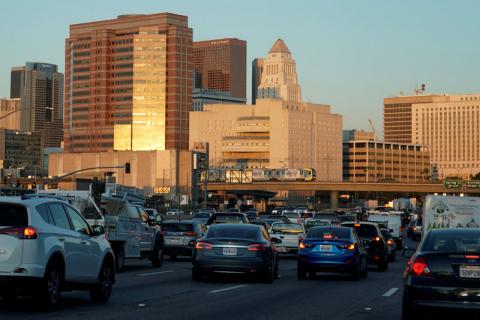Advertisement
U.S. court rejects challenge to EPA review of Obama vehicle rules
WASHINGTON (Reuters) - A federal appeals court on Friday rejected a challenge by California and 16 other states to the Trump administration’s decision to revise strict U.S. vehicle emissions and fuel efficiency rules put in place under former President Barack Obama.
The states sued in May 2018 after the Trump administration reopened a review of the vehicle efficiency standards through 2025. In its final weeks in office, the Obama administration sought to cement the rules in place by completing the "midterm review" more than a year ahead of the April 2018 deadline.
The challenge was seen as the longest shot in a multi-pronged legal effort by states, which are fighting the Trump proposal on a variety of rules. They argue stringent vehicle efficiency rules are crucial to addressing climate change and will save consumers in fuel costs.
The U.S. Court of Appeals for the District of Columbia concluded that because the EPA had not engaged in a "final action" under the Clean Air Act, it would dismiss the petitions for lack of jurisdiction. The court noted the EPA determination that the existing rules were "not appropriate" did not actually change any of the vehicle requirements.
The Alliance of Automobile Manufacturers, a trade group representing General Motors Co, Toyota Motor Corp and Volkswagen AG, praised the ruling, saying that if the states had been successful the agencies would have been prevented from updating the rules.
The autos group argued that the prior determination was "politicized" by the Obama administration, "was concluded early and abruptly and neglecting to gather up-to-date information or input from DOT."
After reopening the rules, the EPA and National Highway Traffic Safety Administration proposed in August 2018 freezing fuel efficiency requirements at 2020 levels through 2026.
Obama-era rules adopted in 2012 called for a fleetwide fuel efficiency average of 46.7 miles per gallon by 2026, with average annual increases of nearly 5%, compared with 37 mpg by 2026 under the Trump administration’s preferred option.
The final rule is expected to modestly boost fuel efficiency from the initial proposal, with some automakers anticipating around 1.5% annual increases, but still much less stringent than the Obama rules.
Last month, a group of 23 states sued to undo the Trump administration’s determination that federal law bars California from setting stiff tailpipe emission standards and zero emission vehicle mandates. They have also pledged to sue once the administration finalizes its new requirements, which is expected before the end of the year. No decision on that suit is expected until 2020.
(Reporting by David Shepardson; Editing by Frances Kerry)



















Add new comment